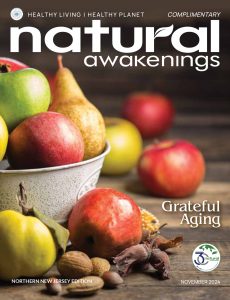Strategies for Minimizing Holiday Food Cravings
Stabilize blood sugar. Creating a morning ritual that includes alkalizing the body upon waking with a green drink, a morning tonic, ginger tea or something similar. Follow that within a half-hour with a small amount of protein. The lack of adequate protein creates an insulin surge and reactive glycemic state that contribute to further fluctuations throughout the day that are difficult to overcome, such as lack of focus and poor decision making. Even for people with no appetite, a bone broth or similar can be sufficient. Throughout the day, small regular meals at two- to three-hour intervals are required. When the last meal of the day is at 6 p.m. and we don’t eat again until 10 a.m. or later, our brain and body suffer.
Eliminate processed foods and foods that contain harmful components that are inflammatory to our system. For at least 30 days, eat only animal protein, including fish and shellfish, vegetables, herbs and spices, a handful of nuts and seeds (preferably soaked and sprouted), healthy saturated fats, including pastured eggs, citrus and berries. These should be whole, live foods prepared mostly at home. We want our vegetables to be free of genetically modified organisms and pesticide residues (organic) and protein sources to be free of antibiotics and growth hormones; 100 percent grass-fed is preferred. We want to forever eliminate sweeteners, food dyes and other additives that are neurotoxic to the brain.
Increase essential fatty acids and healthy fats that include coconuts and their byproducts such as coconut manna; avocados; oils from tree nuts (e.g. macadamia oil); tree fruits (e.g. coconut, olive); clarified butter, or ghee; 100 percent grass-fed or pastured butter; and nut or seed butters (e.g. flax seed and cashew butter). Essential fatty acids like omega oils are also readily available from oysters and other shellfish that feed on algae, and micro-greens that convert the sun’s energy directly into food. All these help reduce inflammation by supplying the cells in our body, which are a self-contained life forms themselves, with much-needed nutrients.
Increase pre-biotic and probiotic foods, particularly those that are lacto-fermented or cultured. These are foods that utilize a culture starter or fermentation process that predigests the naturally occurring sugars and also create a thriving environment for healthy bacteria to flourish, like sauerkraut and kimchi, pickled ginger, chutney, kefis, buttermilk, and crafted yogurts that are sourced from 100 percent grass-fed cows, sheep or goats. Prebiotic foods include bitter, leafy greens such as dandelion greens, watercress and asparagus.
Minimize legumes, which include beans, lentils and peanuts, and are designed by nature to be difficult to digest. For many people, they contribute to gassiness and bloating. A few beans in an otherwise well prepared meal are fine for most people, but most cooks do not take time to adequately soak, sprout and slowly cook their beans, which will then easily convert to a starch and lose the quality protein that is otherwise available. If we are relying solely on beans, nuts, seeds and other plant proteins for nutrients, careful preparation is a must.
Eat more raw dietary fiber, particularly in the form of leafy, green plants. There is a myth that abounds that these plants, particularly the cruciferous vegetables like Brussels sprouts, arugula, broccoli and kale, will somehow steal away precious iodine from the body, especially the thyroid gland. Or, that high-oxalate content foods like spinach, Swiss chard and beet greens should be avoided because of the risk of kidney stones. If these cases exist at all, the probability is so incredibly rare that it is advisable to eat these foods at every meal.
Hydrate. Not only is good water a primary source of trace minerals and nutrients, it’s essential for ridding the body of unwanted wastes.
Dr. Douglas J. Pucci, D.C., FAAIM, regularly offers in-office seminars presenting the latest science and clinical data on neurotoxic illness, hormone disruptions, and chronic disease. He provides nutrition, comprehensive testing for health biomarkers, brain and body care and more. For more information, call 201-261-5430 or visit GetWell-Now.com.

























